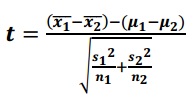In order to see if there are any statistical differences between two groups (male and female) on a dependent variable(ex: Math Final Exam) you should conduct an independent Samples t Test.
Step 1
State the hypothesis
H0: µ1-µ2=0 (µ1=µ2)
H1: µ1-µ2≠0 (µ1 ≠µ2)
This is a two-tailed test (no direction is predicted)
Step 2
Set the criterion
α=?
df= n1+n2-2=
Critical value for the t-test ?
Step 3
Collect sample data, calculate x and s
Step 4
Compute the T-statistic

Step 5
Make a decision about the hypotheses
P-value. The strength of evidence in support of a null hypothesis is measured by the P-value. Suppose the test statistic is equal to S. The P-value is the probability of observing a test statistic as extreme as S, assuming the null hypotheis is true. If the P-value is less than the significance level, we reject the null hypothesis.
Region of acceptance. The region of acceptance is a range of values. If the test statistic falls within the region of acceptance, the null hypothesis is not rejected. The region of acceptance is defined so that the chance of making a Type I error is equal to the significance level.
The set of values outside the region of acceptance is called the region of rejection. If the test statistic falls within the region of rejection, the null hypothesis is rejected. In such cases, we say that the hypothesis has been rejected at the α level of significance.